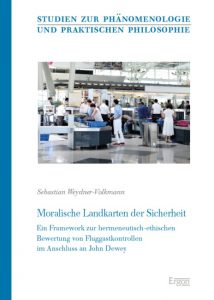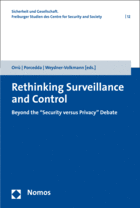Ein Framework zur hermeneutisch-ethischen Bewertung von Fluggastkontrollen im Anschluss and John Dewey.

It was hard work, but I’m happy to announce that my dissertation was finally published and is now available. It took several revisions of the proofs, but I am very happy with the result. Since the book is also a result of the research I conducted in the EU FP7 project XP-DITE, the publishing costs could also be funded as part of the EU FP7 framework. I am thankful for that possibility.
The title of my dissertation could be translated as “Moral Maps of Security Provision. A Hermeneutical Framework for the Ethical Evaluation of Airport Passenger Screening Following John Dewey”. In 2017, it was awarded the Wetzstein Award for Philosophy.
Abstract
The dissertation is written in German and the abstract reads like this:
Die gesellschaftspolitischen Konflikte um die Verschärfung von Fluggastkontrollen belegen, dass es bei Entscheidungen darüber, wie und mit welchen Techniken derartige Kontrollprozesse zu organisieren sind, einen Bedarf an ethischer Expertise gibt. Getroffen werden müssen solche Entscheidungen vor einem komplexen Horizont von Wertvorstellungen, der sich nicht auf den Gegensatz ‚entweder Sicherheit oder Freiheit‘ reduzieren lässt. Entsprechend muss eine informierte Entscheidungsfindung berücksichtigen, welche impliziten Wertvorstellungen uns bei der Forderung nach mehr Sicherheit durch Fluggastkontrollen leiten und welche Wertungskonflikte verschiedene Kontrolltechniken jeweils konkret implizieren.
Über eine hermeneutische Lesart von John Deweys Moralpragmatismus werden in dieser Arbeit jene Wertvorstellungen rekonstruiert, die uns bei der Forderung nach Sicherheit leiten, wie auch jene, die dabei auf dem Spiel stehen. Auf dieser Basis präsentiert die Arbeit eine Methode zur operationalisierten Technikbewertung, über die verschiedene Kontrollprozesse verglichen sowie Handlungsempfehlungen generiert werden können.
Roughly, this translates as the following:
The socio-political conflicts around tightening passenger security screening measures at airports show that there is a need for ethical expertise. Decisions on how to organize the screening process and on which screening technologies to use must be taken in regard to a complex horizon of values that cannot be reduced to the alternative ‘either security or freedom’. Hence, informed decision making must take into account not only which valuations implicitly guide us when we ask for improved security, but also what values specifically come into conflict when organizing the security checks in a certain way.
Through a hermeneutical reading of John Deweys moral pragmatism, this book reconstructs the relevant valuations that guide us in demanding better security and those that are at stake. Building on this, the book presents an operationalized framework for ethical evaluation. It allows to compare the impact of different ways of screening passengers in regard to the relevant valuations, as well as to generate guidelines so as to address unintended negative consequences.
- Link to the DNB listing of the book.
- Table of contents




